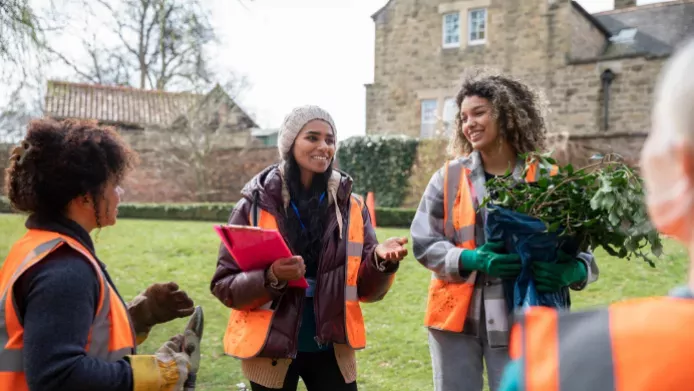Grow Wild funding varies every year for youth and community projects.
For the latest announcements, please sign up to our e-newsletter and look out for posts on our Twitter, Facebook and Instagram. You may also hear from us direct or through one of our wonderful partner organisations.
In the meantime, here are some suggestions for other ways to secure funding and support for your project and some advice on how to approach an application.
Jump to the list of funding networks and opportunities.
Start at the beginning: impact

Before you approach anyone about funding or donations, be clear about what impact their support will have. Rather than getting lost in the details of what their money will pay for, explain how it will make a positive impact.
Funders and supporters love to know how their money has made a difference!
For example:
- 'As a result of your support, fifty more families every year will learn how to grow their own plants and herbs, enhancing their knowledge and skills.'
- 'As a result of your support, one hundred lonely or isolated people will get a chance to make new connections in our community, helping to improve their wellbeing.'
- 'As a result of your support, the whole neighbourhood will experience a new and improved site, which gives them a space to enjoy and connect with nature, and increase their sense of pride in the area.'
If you're not quite sure how your project makes a difference, go through these three steps:
It could be that there aren't enough safe spaces for local people to enjoy. Maybe there is disunity within your community and you want to find ways to bring people together and find common ground. Or maybe you know people want to learn how to grow things, but they don't know where to start.
If you have evidence of a problem, that's really helpful because you can prove that your project is needed!
It's a big leap to go straight from the problem you're solving to what funding will pay for...
There are many, many different ways a project might solve a problem. For example, if you want to create safe spaces you could try various interventions, from campaigning for extra police, to putting up walls and fences, to regular litter-picking. A big difference in approaches!
What is it about how you approach things, how your project is set up, that will help solve this problem?
Once you have worked out what you're going to do to solve the problem, make sure you know how you're going to evaluate it. What's the current baseline? What's a reasonable target for how much your project will achieve?
Even more than knowing their money made a difference, funders love reports on how that difference was made. This could be in the form of graphs and charts (if you can quantify your work and impact) or in stories and testimonials from the people you helped. Or both!
When you make your application for funding, it's a good rule of thumb to express things in the order of the steps above: the difference you will make, how you will make that difference, and how you will report that the difference has been made.
Do your research on who funds what

Now that you know what difference you want to make, you're in a better position to find the kind of funders that might be interested in your project specifically.
There are some staunch funding categories that you'll want to bear in mind, for example: 'Arts, Culture and Heritage', 'Children and Young People', 'Environment', 'Housing', etc. The category names will differ, but the themes will be familiar: think about these when you're working out where to apply for funding.
For example, if your project is only very very loosely connected with housing and far more closely aligned with other categories, don't bother applying to a funder that's interested in housing. It will waste your time and theirs!
If you can't work out which category your project comes under, then go back to the start. If you can't define your project clearly, then a funder certainly won't be able to.
There are loads of places online for you to search for funding opportunities. Here's a few of them:
- Tesco Community Grants (funding from Tesco, supported by Groundwork, for local charities)
- National Lottery, Awards for All, England (grants of £300–£10,000, England only)
- More great suggestions can be found via The Prince's Trust website
- The Chestnut Fund (Grants for conservation from The Conservation Volunteers)
- Grants online (from £15 per month)
- Funding central (free for organisations with an annual income below £100k)
- UK Community Foundations (network of regional foundations that provide funding)
- Funds Online (subscription cost for full access)
- Grin (£15 per year)
- Beehive giving (subscription cost for full access)
- Validaid (from £25 per month)
- Grant Nav (free)
- Funding Scotland (free)
- WCVA Funding Search - Wales (free)
- Grant Tracker - Northern Ireland (free)
- Funding finder by the National Lottery (free)
- My Community - for local development projects (free)
- The National Lottery Community Fund (free)
- Grants4Schools (from £15 per month)
- Live Here Love Here - Northern Ireland (free)
- National Lottery Heritage Fund (free)
Consider local businesses

If yours is a local project, then a local business may want to support it – whether through donations or funding or both.
Do your research! If a local business has supported a project before, it is more likely to again. Unless it was a horrible experience, in which case you may want to tread carefully. If you have a contact that works there, take them out for lunch. Find out if there's an appetite for this kind of thing and who you need to convince.
The kind of things that might make a local business want to support a project are:
- Positive PR – a photo in the local paper, good news stories they can share in-store.
- Employee engagement – a happy workplace is good for business and sometimes simply telling your staff that you're doing good things can help.
- Brand awareness – their logo in prominent place at your site, to help drum up business.
For more advice on connecting with local businesses, head over to Business In the Community.
Give crowdsourcing a try

One way to raise money for your project is to go directly to individuals through crowd-sourcing. This has become a lot more common in recent years; in 2018 a Grow Wild project in Mill Hill raised nearly fifty thousand pounds to transform a local space into a community garden!
Spacehive is a platform that specialises in supporting projects linked to places.
There are many other crowdsourcing platforms available for charities, including Crowdfunder, Indiegogo and JustGiving.
